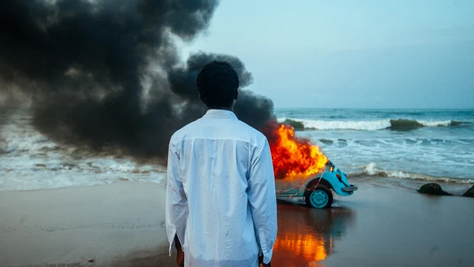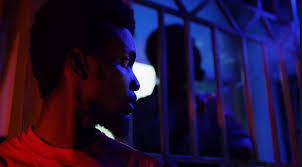Black Artists on the Rise: Recommendations
- Lydia Smith

- Feb 27, 2021
- 7 min read
Updated: Aug 15, 2021
In honor of Black History Month, I wanted to advertise a couple recent movies made by black filmmakers that are streaming right now.
Selah and the Spades (2019)
Director: Tayarisha Poe

Given the current market for high school-set films, I am quite shocked at the lack of attention Selah and the Spades received. A preppy setting, imaginative factions and lingo that rival Rian Johnson’s Brick, and a really stellar visual style come together in a moody and idiosyncratic exploration of the underbelly of a private school’s student life. Lovie Simone plays Selah, the leader of the Spades, the illicit substance coordinators of Haldwell School. In tense but cordial collaboration with the other four groups who help keep the truth under wraps, Selah helps bring the secret party life of Haldwell to life. However, she’s graduating next year: she needs an apprentice to take over her position.

Despite what I will admit is a slightly unfocused principle narrative, Poe keeps her viewers curious with distinct visual cues (the party scenes, wow), colorful characters, and a unique central relationship. Selah’s blossoming friendship with Paloma (the transfixing Celeste O’Connor, who reminds me a great deal of Olivia Cooke) is subject for speculation on the grounds of platonism and mutuality. There are definitive feminist undertones that come to fruition during a particular speech by Selah, which has a good message to girls. It’s always nice to see Jharrel Jerome (Moonlight) pop up, too.
I think this is a memorable debut, and that it even has the capacity for the label of “cult classic” among the likes of Heathers and Rushmore. If this kind of movie appeals to you, by all means check it out. I greatly anticipate Poe’s follow-up.

Streaming: Amazon Prime
Judas and the Black Messiah (2021)
Director: Shaka King

In a devastating turn of events I was unable to watch Judas and the Black Messiah at Sundance; however, in a not so devastating turn of events, it was released on HBO Max just weeks later. Let me first say that this is one hell of a historical movie. It follows the final years of Black Panthers chairman Fred Hampton (Daniel Kaluuya) when he was being spied on by Bill O’Neill (Lakeith Stanfield), an informant for the FBI. It’s very easy for a filmmaker to decide to document a legendary figure’s rise and fall, but by narrowing in on this one particular period, all of the vagueness and oversimplification of matters that comes with a life-long biopic is eliminated. Instead, we are viewers of a complex political situation from multiple lenses: Hampton himself, his girlfriend Deborah, Bill O’Neill, and even the head of the FBI. Bill’s unusual situation makes his arc totally compelling from beginning to end, and although the entire cast is really all aces, Lakeith Stanfield blows me away in every single role he takes on. It has been a dream come true to watch his career take off, and he was particularly good in this role. Dominique Fishbeck, I will add, deserves serious award consideration as well.

The look of the movie is slick and Shaka King is clearly confident behind the camera: I never once doubted why a scene was present, such was my belief that not a single moment was wasted across the two hour runtime. Although it rarely delves into full-on political preaching, I felt that sufficient ground was covered in demonstrating the nature of Hampton’s views and the ruthlessness of J. Edgar Hoover at this point in time. Swift, bold, and brutal, I think Judas and the Black Messiah will stand as one of the best movies of the year. Do check this out.

Streaming: HBO Max
Luce (2019)
Director: Julius Onah

Where to begin with Luce? Well, I was stressed out the entire time. I was actually quite angry. But, due to my belief that these were the feelings that the film was trying to evoke, I think it’s really good. Kelvin Harrison Jr. plays Luce, the high school golden boy and adopted son of Amy and Peter Edgar. Luce is an academic superstar, a strong athlete, and a persuasive speech-giver. He’s got what appear to be pure intentions, and a smile that could make you melt. But his government teacher, Ms. Wilson (a career-best performance from Octavia Spencer), doesn’t think he’s all he’s cracked up to be. When Luce writes a provocative essay on a violence-advocating pan-African revolutionary, Ms. Wilson starts to question whether he’s hiding something more sinister.

This film covers a lot of ground.I was whipped every which way, implored to sympathize with characters I would never have wished to, and left dumbfounded (in a good way) at the conclusion. The movie cuts through topics of race, tokenism, PTSD, and sexual violence in a surprisingly succinct and balanced way. It’s not exactly villainizing anyone, but it sure does dig into human error and toxic traits, manipulation and trust, and the complexity of parental love. If I were to ding anything about this movie it’d be the ol’ “that is not how high schoolers talk,” but I think the soapiness of the dialogue works because of the tenebrosity of the subject matter. The tension is so ridiculously palpable whenever Harrison and Spencer share a scene that you can choose to ignore the fact that Harrison is actually 24 years old and not 17.
Given that this man previously directed The Cloverfield Paradox, it’s safe to say that Luce is a tremendous upgrade for Julius Onah and will probably stand as one of the most compelling character dramas in recent memory. I recommend it to anyone who likes a good nail-biter.

Streaming: Hulu
One Night in Miami (2020)
Director: Regina King

Making a movie that is 90% dialogue taking place in a single room is typically pretty difficult to achieve. A play is not always made for the screen. Regina King however, in collaboration with Kemp Powers (the co-writer and co-director of Soul), brings dynamism and great depth to a fascinating foursome- African American greats Malcolm X, Cassius Clay, Jim Brown, and Sam Cooke- as they discuss the plight of segregation in the south and what changes should be made: and it’s totally cinematic. Although fictional liberties were obviously taken in this depiction of this fateful meeting, the crux of the story remains true, as do the distinct personalities occupying the room. Parallel to Judas, I tried to locate a weak link in the bunch to no avail: every single actor brought their A game. Kingsley Ben-Adir brought a grace and profundity to Malcolm X not seen since Denzel. Aldis Hodge is quickly becoming a name I wish to follow more closely. Eli Goree shines bright in several key scenes. And Leslie Odom Jr. truly has the voice of an angel, delivering on what could be an emotionally manipulative finale with so much passion and soul that it provokes genuine tears. Just listen to Speak Now on Spotify, if you don’t believe me.

With race relations coming to the forefront of many American conversations today, it is always important to reflect upon the trailblazers who pushed that dialogue. This measured and compassionate interpretation is food for thought, and I sincerely hope it doesn’t get lost among the “best of 2020” discussion simply because of its modesty of scope. This should be a career-launcher for all four actors, and a serious candidate for best debut of the year. Regina King has great things to come.

Streaming: Amazon Prime
Residue (2020)
Director: Merawi Gerima

This is an interesting movie for me to recommend because, in all honesty, it didn’t fully resonate with me first viewing. Non-linear storytelling and imaginative visuals are, if a good sign of potential, a little risky for a debut. But this movie had a shoestring budget. Director Gerima was literally pulling people off the street to participate- he shot his first draft of the script with a DP he met three days before shooting- and essentially connected all the loose ends during production in the summer of 2017. I think because of the way this movie was made, especially in being an informal memoir of the director/writer’s hometown in D.C., I was captivated enough by the process to ignore my misgivings if it meant promoting the work of a community coming together to have Gerima’s story told. Ava DuVernay clearly saw something special, as she was the one to notice the film at Sundance and pick it up for her company Array. And now, a few years later, it’s streaming on Netflix; regardless of my immediate reaction to it, I would easily recommend it.

Gerima focuses his passion into a critique of gentrification, the policing system, and unspoken social norms that seep through the cracks of our highly sensitive societal infrastructure. This, along with a reflection on hometown: family, friends, peers who have barely budged while the landscape around them transforms. As I mentioned, the visual style is very unique: the saturation of yellows and greens in the sticky D.C. summer against the scorching oranges and reds of the late night streetlights. Gerima wants people to know that the imperfections are in fact his favorite part of the project. “It's like what we didn't have caused us to shoot it in that way. That's my favorite thing about it, those serendipitous mistakes that we edited into the film,” (Source 1). It’s 90 minutes, and you’re supporting an independent filmmaker, so do consider checking it out.
Source 1- here.

Streaming: Netflix
Bonus:
The Burial of Kojo (2018)
Director: Blitz Bazawule

This is actually a Ghanan film that I came across that I thought was so interesting that I had to sneak it in this list. Essentially, it’s a combination of folklore and realism set against the rural village of Nzulezo. I know that very few people have seen this, so let me hype it up really quickly so people check it out!
Shot on a tiny, tiny budget entirely in Ghana, Blitz Bazawule directed, wrote, co-edited, and composed the music for this stunning 80 minute arthouse film. If you recognize his name, it is because he went on to direct Beyonce’s Black is King visual album the year after (and his cinematographer, Michael Fernandez, also returned for this follow-up project). Many of the images are unbelievably gorgeous, which is considerable given the fact that it was mostly shot on handheld. I have no desire to give away much of the plot, but know that it’s lyrical and a bit fantastical, but also very humane in its central conflict. I am manifesting that this movie becomes a cult classic because it is on Netflix right now and literally nothing is stopping you from watching it.
Streaming: Netflix
-Lydia










Comments